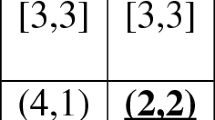Abstract
“Can we find a pair of extensive form games that give rise to the same strategic form game such that, when played by a reasonable subject population, there is a statistically significant difference in how the games are played?” (Kreps, 1990, p. 112). And if yes, “can we organize these significant differences according to some principles that reflect recognizable differences in the extensive forms?” Both questions are answered positively by reporting results from three different experiments on public goods provision, resource dilemmas, and pure coordination games.
Similar content being viewed by others
References
Budescu DV, Rapoport A, Suleiman R (1990). Resource dilemmas with environmental uncertainty and asymmetric players. European Journal of Social Psychology 20:475–487
Budescu DV, Rapoport A, Suleiman R (1992) Simultaneous vs. sequential requests in resource dilemmas with incomplete information. Acta Psychologica 80: 297–310
Budescu DV, Suleiman R, Rapoport A (in press) Positional order effects in social dilemmas games with uncertain resources. Organizational Behavior and Human Decision Processes 61: 225–238
Cooper R, De Jong DV, Forsythe R, Ross TW (1990) Selection criteria in coordination games: Some experimental results. American Economic Review 80: 218–233
Crawford VP (1991) An “evolutionary” interpretation of Van Huyck, Battalio, and Beil's experimental results on coordination. Games and Economic Behavior 3: 25–59
Erev I, Rapoport A (1990) Provision of step-level public goods: The sequential contribution mechanism. Journal of Conflict Resolution 34: 401–425
Harrison GW, Hirshleifer J (1989) An experimental evaluation of the weakest link/best shot model of public goods. Journal of Political Economics 92: 201–215
Hoffman E, McCabe K, Schachat K, Smith V (in press) Preferences, property rights and anonymity in bargaining games. Games and Economic Behavior
Kohlberg E, Mertens J-F (1986) On the strategic stability of equilibrium. Econometrica 54: 1003–1037
Kreps DM (1990) Game theory and economic modelling. Clarendon Press, Oxford
Luce RD (1992) Rational versus plausible accounting equivalences in preference judgments. In Edwards W (Ed.): Utility theories: Measurements and applications. Kluwer Academic Press, Boston: 187–206
Page EB (1963) Ordered hypotheses for multiple treatments: A significance test for linear ranks. Journal of the American Statistical Association 58: 216–230
Rapoport A (1985) Provision of public goods and the MCS experimental paradigm. American Political Science Review 79: 149–155
Rapoport A (1987) Research paradigms and expected utility models for the provision of step-level public goods. Psychological Review 94: 74–83
Rapoport A, Budescu DV, Suleiman R (1993) Sequential requests from randomly distributed shared resources. Journal of Mathematical Psychology 37: 241–265
Rapoport A, Budescu DV, Suleiman R, Weg E (1992) Social dilemmas with uniformly distributed resources. In Liebrand WBG, Messick DM, Wilke HAM (Eds.): A social psychological approach to social dilemmas. Pergamon Press, Elmsford, NY: 43–57
Rapoport A, Erev I (in press). Provision of step level public goods: Effects of different information structures. In Schulz U, Albers W, and Mueller U (Eds.): Social dilemmas and cooperation. Springer-Verlag New York
Rapoport A, Suleiman R (1992) Equilibrium solutions for resource dilemmas. Group Decision and Negotiation 1: 269–294
Roth AE (1995) Bargaining experiments. In Kagel J, Roth AE (Eds.): Handbook of experimental economics. Princeton University Press, Princeton
Schelling T (1960) The strategy of conflict. Harvard University Press Cambridge, Mass
Schelling T (1978) Micromotives and macrobehavior. Norton New York
Schotter A, Weigelt K, Wilson C (1991) A laboratory investigation of multi-person rationality and presentation effects. Unpublished manuscript. Department of Economics, New York University
Suleiman R, Rapoport A (1988) Environmental and social uncertainty in single-trial social dilemmas. Acta Psychologica 68: 99–112
Van de Kragt AJC, Orbell JM, Dawes RM (1983) The minimal contributing set as a solution to public goods problems. American Political Science Review 77: 112–122
Van Huyck, JB, Battalio RC, Beil RD (1990) Tacit coordination games, strategic uncertainty, and coordination failure. American Economic Review 80: 234–248
Van Huyck JB, Battalio RC, Beil RD (1991) Strategic uncertainty, equilibrium selection, and coordination failure in average opinion games. Quarterly Journal of Economics 106: 885–910
Von Neumann J, Morgenstern O (1947) Theory of games and economic behavior, (2nd Ed.) Princeton University Press Princeton
Author information
Authors and Affiliations
Rights and permissions
About this article
Cite this article
Rapoport, A. Order of play in strategically equivalent games in extensive form. Int J Game Theory 26, 113–136 (1997). https://doi.org/10.1007/BF01262516
Received:
Revised:
Issue Date:
DOI: https://doi.org/10.1007/BF01262516




